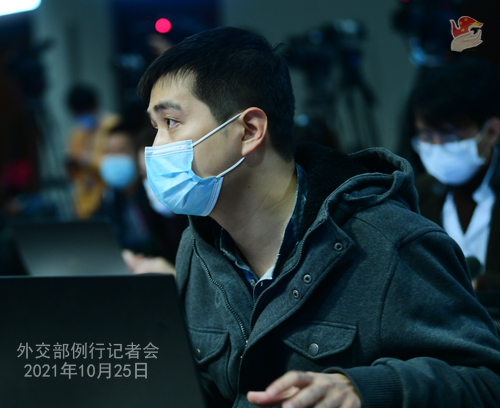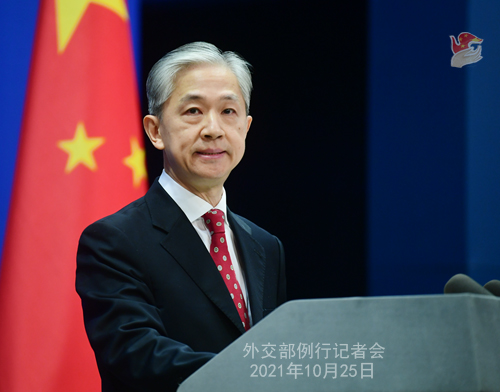
1. At the invitation of Sultan Haji Hassanal Bolkiah of Brunei Darussalam, the current ASEAN chair, Premier of the State Council Li Keqiang will attend the 24th ASEAN-China Summit, the 24th ASEAN Plus Three Summit, and the 16th East Asia Summit from October 26 to 27. The meetings will be held through video conference.
2. At the invitation of Qatari Deputy Prime Minister and Foreign Minister Sheikh Mohammed bin Abdulrahman Al Thani, State Councilor and Foreign Minister Wang Yi will visit Qatar from October 25 to 26. During his stay in Doha, State Councilor Wang Yi will meet with a delegation of the interim government of the Afghan Taliban.
3. At the invitation of Minister of Foreign Affairs of Greece Nikos Dendias, the Minister of Foreign Affairs of Serbia Nikola Selaković, Minister for Europe and Foreign Affairs of Albania Olta Xhaçka and Minister of Foreign Affairs of Italy Luigi Di Maio, State Councilor and Foreign Minister Wang Yi will visit Greece, Serbia, Albania and Italy from October 27 to 29.
CCTV: Today marks the 50th anniversary of the restoration of New China's lawful seat in the United Nations. What is China assessment of the past 50 years?
Wang Wenbin: As you said, today marks the 50th anniversary of the restoration of New China's lawful seat in the United Nations, which was a momentous event for the world and the United Nations. It marked the return of the Chinese people, or one-fourth of the world's population, back to the UN stage. The importance was significant and far-reaching for both China and the wider world.
This morning, President Xi Jinping attended the Conference Marking the 50th Anniversary of the Restoration of the Lawful Seat of the People's Republic of China in the United Nations in Beijing and delivered an important speech, which reviewed history and took stock of China's contribution to the cause of the UN and world peace and development over the past 50 years since the restoration, and looked into the future and laid out China's proposal and initiative on deepening cooperation with the UN, promoting peace and development of humanity and work toward a community with a shared future for mankind. The speech is highly relevant with far-reaching historical significance, attracts broad international attention and is warmly received by all parties.
President Xi Jinping pointed out that, for the past 50 years, the Chinese people have demonstrated an untiring spirit and kept to the right direction of China's development amidst changing circumstances, thus writing an epic chapter in the development of China and humanity; the Chinese people have stood in solidarity and cooperation with people around the world and upheld international equity and justice, contributing significantly to world peace and development; the Chinese people have upheld the authority and sanctity of the United Nations and practiced multilateralism, and China's cooperation with the United Nations has deepened steadily.
President Xi Jinping stressed that, in the world today, changes unseen in a century are accelerating, and the force for peace, development and progress has continued to grow. It falls upon us to follow the prevailing trend of history, and choose cooperation over confrontation, openness over seclusion, and mutual benefit over zero-sum games. We shall be firm in opposing all forms of hegemony and power politics, as well as all forms of unilateralism and protectionism.
President Xi Jinping pointed out that, we should vigorously advocate peace, development, equity, justice, democracy and freedom, which are the common values of humanity, and work together to provide the right guiding philosophy for building a better world. We should jointly promote the building of a community with a shared future for mankind, and work together to build an open, inclusive, clean and beautiful world that enjoys lasting peace, universal security and common prosperity. We should stay committed to mutual benefit and win-win results, and work together to promote economic and social development for the greater benefit of our people. We should step up cooperation, and work together to address the various challenges and global issues facing humanity. We should resolutely uphold the authority and standing of the United Nations, and work together to practice true multilateralism.
Standing at a new historical starting point, China will stay committed to the path of peaceful development and always be a builder of world peace. China will stay committed to the path of reform and opening-up and always be a contributor to global development. China will stay committed to the path of multilateralism, always be a defender of the international order and work tirelessly for the lasting and peaceful development of the world and for building a community with a shared future for mankind!
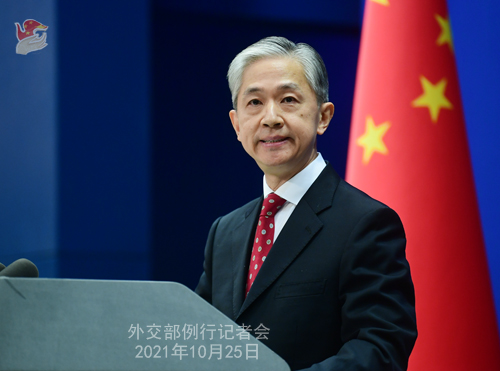
People's Daily: You just announced that Premier Li Keqiang will attend a series of leaders' meetings on East Asia cooperation. How does China see the current East Asia cooperation and what's your expectations for the upcoming summits?
Wang Wenbin: East Asia is one of the most vibrant regions in the world with the greatest potential. Currently, East Asia cooperation enjoys an overall sound momentum. The ASEAN-centered East Asia cooperation mechanism has played an important role in promoting dialogue and cooperation and safeguarding regional stability and development. China sees ASEAN as a priority in its neighborhood diplomacy and always attaches high importance to regional cooperation in East Asia. This year marks the 30th anniversary of the establishment of dialogue relations between China and ASEAN. The two sides are working to upgrade their strategic partnership and forge a closer community with a shared future, which will surely inject fresh impetus into East Asia cooperation. At the same time, East Asia cooperation faces more complicated factors with the continued spread of COVID-19 in the region, unbalanced economic recovery and attempts by a handful of countries to gang up and form cliques.
China hopes that the upcoming summits will converge consensus, deepen cooperation, and uphold the correct direction of East Asia cooperation and regional stability and prosperity through the following efforts. First, strengthen regional capability to deal with public health challenges. We need to further consolidate regional outcomes in combating COVID-19, deepen vaccine cooperation and improve contingency medical supplies reserve. Second, jointly promote green recovery and sustainable development. We need to dovetail post-COVID development plans, work for the coordinated, balanced and innovative development of industrial and supply chains, enhance cooperation in orderly energy transformation and address climate change. Third, consolidate the momentum for economic integration. We need to work for the scheduled entry into force of the RCEP to deliver dividends at an early date. Fourth, safeguard regional peace and stability. We need to stay committed to the ASEAN-centered open and inclusive regional cooperation architecture, properly handle hotspot and sensitive issues in the region through dialogue and consultation, and oppose acts that create division and undermine regional peace and stability.
Xinhua News Agency: Can you share with us the purpose of and consideration for State Councilor and Foreign Minister Wang Yi's visit to Qatar and his meeting with the delegation of the interim government of the Afghan Taliban?
Wang Wenbin: Qatar is an important country in the Middle East and the Gulf region, and China's key partner of energy and economic and trade cooperation in the Middle East and the Gulf region. It has a unique role in and influence on Afghanistan and other regional hotspot issues. In recent years, under personal attention and strategic guidance of President Xi Jinping and Emir Sheikh Tamim bin Hamad Al Thani, China-Qatar relations have been rapidly and deeply advanced with fruitful outcomes in cooperation in various sectors, even closer people-to-people exchange and good communication and coordination in international and regional affairs. This visit by State Councilor and Foreign Minister Wang Yi will further implement the important consensus reached by the two heads of state on developing bilateral relations, deepen political mutual trust between China and Qatar, strengthen bilateral practical cooperation and work toward new progress in China-Qatar strategic partnership.
Since August this year, fundamental changes have taken place in the Afghan situation, and the Afghan people are seeing a historic opportunity to independently take control of their country's future. Meanwhile, the Afghan people are also facing many difficulties and challenges, where there is an urgent need for external support. As a traditionally friendly neighbor and cooperation partner of Afghanistan, China always calls for dialogue and engagement to guide the Afghan situation towards positive development and help the people tide over difficulties. Against such a backdrop, the Chinese side and the Afghan Taliban authorities have agreed to meet in Doha. This is a follow-up of past interactions including the meeting in Tianjin in July this year, and also the first high-level meeting between the two sides since the Afghan Taliban's formation of the interim government. Both sides will take this opportunity to have an in-depth exchange of views on the Afghan situation and issues of common interests.
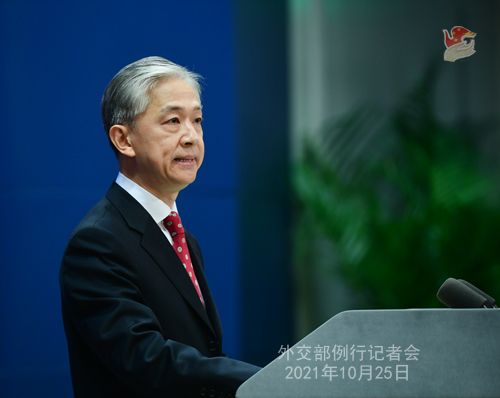
China Daily: Could you share more with us on the purpose of and consideration for State Councilor and Foreign Minister Wang Yi's visit to Greece, Serbia, Albania and Italy?
Wang Wenbin: Greece, Serbia, Albania and Italy are important cooperation partners of China in Europe. China and these four countries boast profound traditional friendship, have close cooperation across the board and share fruitful outcomes in BRI cooperation. This visit to the four countries by State Councilor and Foreign Minister Wang Yi fully demonstrates China's willingness to consolidate bilateral friendship, deepen China-CEEC cooperation, and promote the healthy and steady development of the relations between China and the European side.
During the visit, State Councilor and Foreign Minister Wang Yi will have in-depth communication with all parties, build on traditional friendship, deepen practical cooperation and promote common development. China stands ready to work with the four countries to elevate bilateral relations, provide greater driving force for China-CEEC cooperation and the relationship between China and the European side, and inject more positive energy to upholding multilateralism and international fairness and justice.
The Paper: UN Secretary-General Antonio Guterres said recently that the G20 is hoped to raise funds for equitable vaccine distribution, and that "vaccine nationalism and hoarding are putting us all at risk". According to US media reports, the number of vaccines wasted in the US far outweighs the number of jabs administered in many developing countries. As statistics of the USCDC show, from March to September this year, at least 15.1 million doses of COVID vaccines were wasted in the US. What is your comment?
Wang Wenbin: We have seen relevant reports. It is China's consistent belief that fighting the pandemic is a shared responsibility of all countries. Countries strong in vaccine R&D and production, especially some developed countries, should earnestly take responsibility, abandon "vaccine nationalism", put their promise of providing vaccines for other countries into practice as soon as possible, and take real actions to improve the accessibility and affordability of COVID vaccines in developing countries to contribute to an early global victory over the pandemic.
China earnestly fulfills the pledge made by President Xi Jinping to make vaccines a global public good. We have provided more than 1.5 billion doses of vaccines to more than 100 countries and international organizations and strive to provide two billion doses to the world in the course of this year. On top of the US$100 million donation to COVAX, China will donate an additional 100 million doses of vaccines to fellow developing countries. Following the vision of a global community of health for all, China firmly opposes "vaccine nationalism" and will continue to make China's contribution to equitable vaccine distribution.
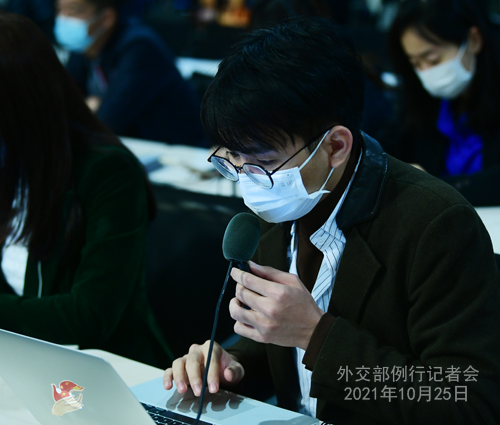
Bloomberg: The State Department said that on October 22, the American Institute in Taiwan and the Taipei Economic and Cultural Representative Office convened high-level representatives for a virtual forum on the theme of expanding Taiwan's ability to participate meaningfully at the UN in such areas as global public health, environment and climate change, etc. What's the foreign ministry's comment on this virtual meeting?
Wang Wenbin: The United Nations is an intergovernmental international organization composed of sovereign states. Resolution 2758 adopted by the General Assembly in 1971 has solved once and for all the issue of the PRC's representation in the UN in political, legal and procedural terms. The system, agencies and the Secretariat of the UN should abide by the one-China principle and UNGA Resolution 2758 when dealing with Taiwan-related affairs. The vast number of UN member states, including the US, recognize that there is only one China in the world and Taiwan is an inalienable part of China's territory. The participation of the Taiwan region in activities of international organizations must be handled in accordance with the one-China principle. The Taiwan authorities' attempt to expand the so-called "international" space by brownnosing foreign forces is in essence trying to expand the room for "Taiwan independence" and separatism and will only prove a failure.
We urge the US to abide by the one-China principle and the stipulations of the three China-US joint communiqués, observe UNGA Resolution 2758, stop official contact with Taiwan, stop making irresponsible remarks, refrain from sending wrong signals to the "Taiwan independence" forces in any form, avoid emboldening or supporting the Taiwan authorities in expanding the room for "Taiwan independence", and stop doing things that undermine China-US relations and damage peace and stability across the Taiwan Strait.
China News Service: As October 25 marks the SADC Anti-Sanctions Day, several African countries call on the West to lift illegal sanctions on Zimbabwe at an early date. Do you have any comment?
Wang Wenbin: The 39th Ordinary Summit of the Heads of State and Government of the Southern African Development Community (SADC) in 2019 designated the 25th of October as the Anti-Sanctions Day, a day calling on the US and some Western countries to lift the illegal sanctions imposed on Zimbabwe. Today marks the third Anti-Sanctions Day. We noted that African countries have once again made the voice of justice, and we support that.
The unwarranted sanctions imposed on Zimbabwe by the US and some other Western countries have been in place for 20 years. They have gravely hobbled Zimbabwe's capability to develop economy and improve people's livelihood and hampered Southern Africa's efforts to deepen cooperation and achieve common development. According to estimations from local media in Zimbabwe, those sanctions have caused economic losses of more than 40 billion dollars in the country.
China firmly supports Zimbabwe in opposing external interference and pursuing the path of independent development. We once again solemnly call on certain organizations and countries, including the US, to lift illegal sanctions on Zimbabwe as soon as possible, and focus more on helping Zimbabwe fight the epidemic and resume economic development, and play a constructive role in promoting Africa's peace and development.
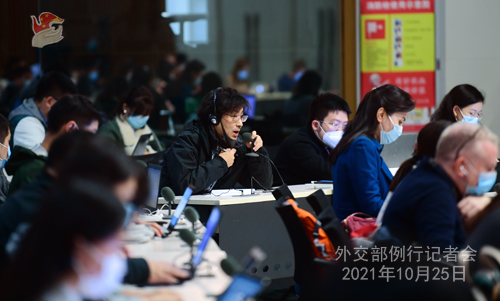
RIA Novosti: Earlier in the day, media reported that Sudanese Prime Minister was placed under house arrest by unknown military forces while several cabinet ministers were arrested. I wonder if China has any comment on the situation and if China is considering evacuation of its embassy.
Wang Wenbin: China is following the latest developments in Sudan, and calls on relevant parties in Sudan to resolve differences through dialogue and maintain national peace and stability.
At present, the Chinese embassy is operating normally. China will closely follow the developments and take necessary measures to ensure the safety and security of Chinese institutions and people in Sudan.
Kyodo News: The US and China have reportedly agreed to hold a video conference between the two heads of state within the year. Do you have more information on the specific arrangement and details at this point?
Wang Wenbin: We have already responded to this question and I have no additional information to offer.
Beijing Youth Daily: On October 22, the joint statement of the online G7 Trade Ministers' Meeting was released, which read that "state-sponsored forced labour of vulnerable groups and minorities" exist in "the agricultural, solar and garment sectors". What is China's comment?
Wang Wenbin: For some time, a few Western countries have been spreading lies and rumors about "forced labor" unscrupulously to smear and suppress developing countries, interfere in others' internal affairs, undermine the stability of international industrial and supply chains and disrupt global cooperation against climate change. Such a blatant attempt for political manipulation under the pretext of human rights is doomed to fail, and is widely rejected and opposed by the international community.
